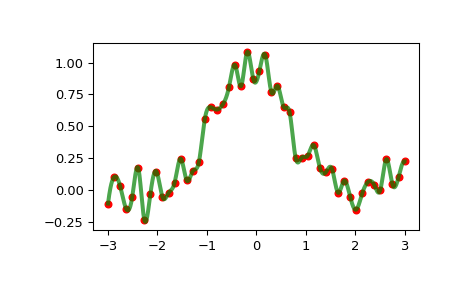scipy.interpolate.InterpolatedUnivariateSpline¶
-
class
scipy.interpolate.InterpolatedUnivariateSpline(x, y, w=None, bbox=[None, None], k=3, ext=0, check_finite=False)[source]¶ 1-D interpolating spline for a given set of data points.
Fits a spline y = spl(x) of degree k to the provided x, y data. Spline function passes through all provided points. Equivalent to
UnivariateSplinewith s=0.- Parameters
- x(N,) array_like
Input dimension of data points – must be strictly increasing
- y(N,) array_like
input dimension of data points
- w(N,) array_like, optional
Weights for spline fitting. Must be positive. If None (default), weights are all equal.
- bbox(2,) array_like, optional
2-sequence specifying the boundary of the approximation interval. If None (default),
bbox=[x[0], x[-1]].- kint, optional
Degree of the smoothing spline. Must be 1 <= k <= 5.
- extint or str, optional
Controls the extrapolation mode for elements not in the interval defined by the knot sequence.
if ext=0 or ‘extrapolate’, return the extrapolated value.
if ext=1 or ‘zeros’, return 0
if ext=2 or ‘raise’, raise a ValueError
if ext=3 of ‘const’, return the boundary value.
The default value is 0.
- check_finitebool, optional
Whether to check that the input arrays contain only finite numbers. Disabling may give a performance gain, but may result in problems (crashes, non-termination or non-sensical results) if the inputs do contain infinities or NaNs. Default is False.
See also
UnivariateSplinea smooth univariate spline to fit a given set of data points.
LSQUnivariateSplinea spline for which knots are user-selected
SmoothBivariateSplinea smoothing bivariate spline through the given points
LSQBivariateSplinea bivariate spline using weighted least-squares fitting
splrepa function to find the B-spline representation of a 1-D curve
spleva function to evaluate a B-spline or its derivatives
sproota function to find the roots of a cubic B-spline
splinta function to evaluate the definite integral of a B-spline between two given points
spaldea function to evaluate all derivatives of a B-spline
Notes
The number of data points must be larger than the spline degree k.
Examples
>>> import matplotlib.pyplot as plt >>> from scipy.interpolate import InterpolatedUnivariateSpline >>> x = np.linspace(-3, 3, 50) >>> y = np.exp(-x**2) + 0.1 * np.random.randn(50) >>> spl = InterpolatedUnivariateSpline(x, y) >>> plt.plot(x, y, 'ro', ms=5) >>> xs = np.linspace(-3, 3, 1000) >>> plt.plot(xs, spl(xs), 'g', lw=3, alpha=0.7) >>> plt.show()

Notice that the
spl(x)interpolates y:>>> spl.get_residual() 0.0
Methods
__call__(self, x[, nu, ext])Evaluate spline (or its nu-th derivative) at positions x.
antiderivative(self[, n])Construct a new spline representing the antiderivative of this spline.
derivative(self[, n])Construct a new spline representing the derivative of this spline.
derivatives(self, x)Return all derivatives of the spline at the point x.
get_coeffs(self)Return spline coefficients.
get_knots(self)Return positions of interior knots of the spline.
get_residual(self)Return weighted sum of squared residuals of the spline approximation.
integral(self, a, b)Return definite integral of the spline between two given points.
roots(self)Return the zeros of the spline.
set_smoothing_factor(self, s)Continue spline computation with the given smoothing factor s and with the knots found at the last call.
validate_input
